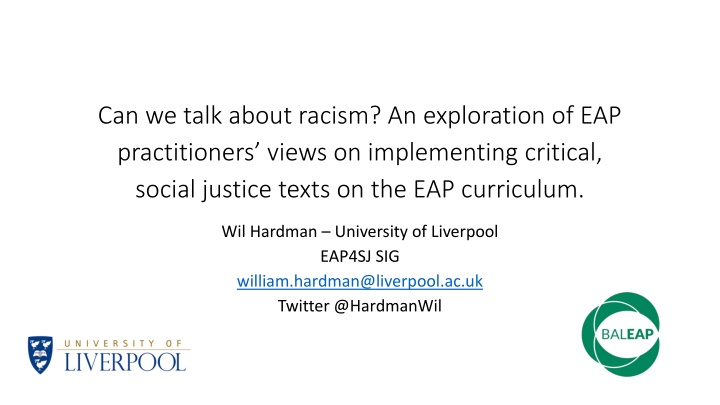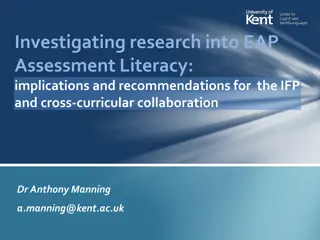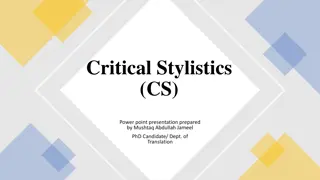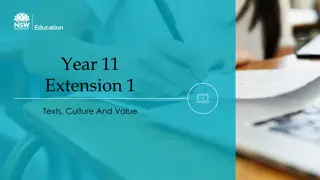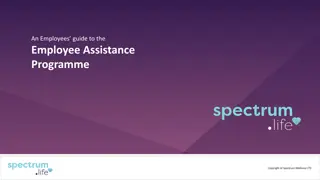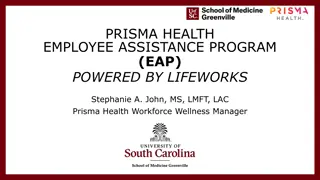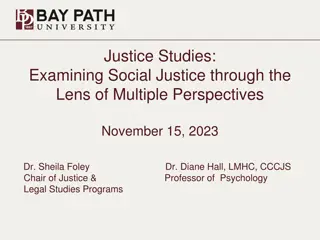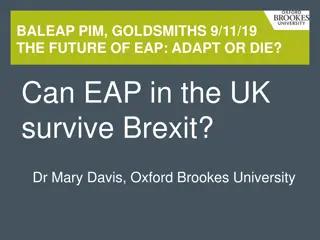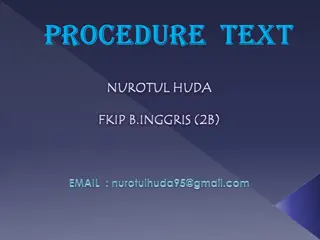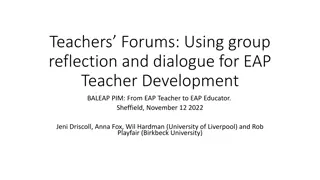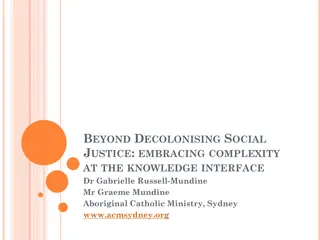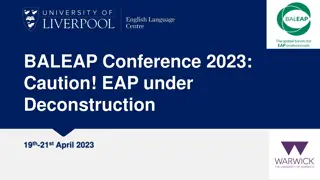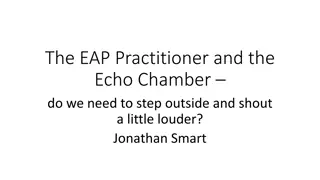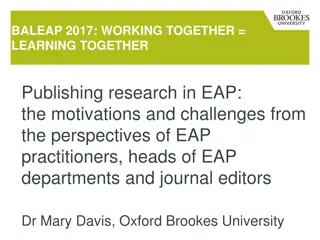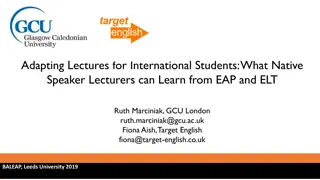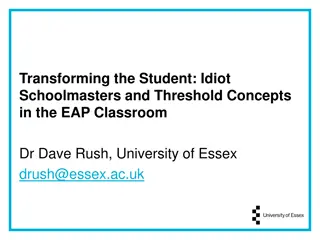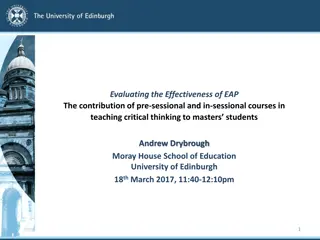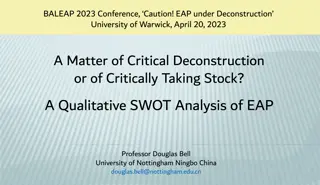Exploration of EAP Practitioners' Views on Implementing Critical Social Justice Texts
An in-depth look into how EAP practitioners perceive the integration of critical, social justice texts in the EAP curriculum. The debate surrounding the political nature of EAP, recent discussions, and session overviews in educational contexts are explored, with a focus on a specific talk by JPB Gerald.
Download Presentation

Please find below an Image/Link to download the presentation.
The content on the website is provided AS IS for your information and personal use only. It may not be sold, licensed, or shared on other websites without obtaining consent from the author.If you encounter any issues during the download, it is possible that the publisher has removed the file from their server.
You are allowed to download the files provided on this website for personal or commercial use, subject to the condition that they are used lawfully. All files are the property of their respective owners.
The content on the website is provided AS IS for your information and personal use only. It may not be sold, licensed, or shared on other websites without obtaining consent from the author.
E N D
Presentation Transcript
Can we talk about racism? An exploration of EAP practitioners views on implementing critical, social justice texts on the EAP curriculum. Wil Hardman University of Liverpool EAP4SJ SIG william.hardman@liverpool.ac.uk Twitter @HardmanWil
The Is EAP apolitical? debate Stretches back at least to early 1990s (e.g. Benesch, 1993; Allison, 1996; Pennycook, 1997; Fenton-Smith, 2014) Critical EAP vs Accommodationist EAP challenges power discourse of pragmatism around needs sociopolitical topics carrier content education is political apolitical, neutral, impartial
Is the debate over? Recent discussion on BALEAP jiscmail: Should striking be allowed? (Le Seeulleur, 2023) We should not be closing down conversations nor pushing a dubious revolutionary political agenda. It is as legitimate a point of view to oppose strikes as to support them. Recent blog by Olwyn Alexander on carrier content (2022): Teachers select texts on the basis of topic this often means that the texts they choose reflect their own Arts & Humanities backgrounds and left-liberal ideologies
Session overview Part 1: Watch a talk Bad at English by JPB Gerald Part 2: Discussion / reflections on talk Part 3: Broader discussion / sharing of experiences
Teaching context (where the talk was introduced) Talk was incorporated as part of a summer pre-sessional course Part of a series of lectures on different topics Students are given a pre-reading text Students conduct a small group discussion on the lecture Aim of discussion is to build a shared critical understanding of the lecture
I showed this talk live in the BALEAP2023 session. If you would like to watch the talk or use it in your practice please contact JPB Gerald directly, alternatively you could buy his excellent book on which this talk was based. Justin s email is: JUSTIN.GERALD22@myhun ter.cuny.edu JPB Gerald (2021)
Discussion / reflections on talk What are the benefits of using this text on a pre-sessional course? Are there any potential considerations or drawbacks? Why do you think the talk elicited polarised reactions from teachers?
Broader discussion / sharing of experiences Have you ever used texts on the topic of racism in EAP? If so, how did it go? If not, why not? How about other social justice-oriented texts? What forms of social justice are permitted and promoted in EAP/HE? Why? And to what effect? Who benefits? What discourses/practices of social justice remain marginalised and why?
Closing reflections Decolonising the curriculum and EDI seems to be okay in theory but not necessarily in practice (Eddo-Lodge, 2018) I was a bit na ve and should have prepared tutors better I want to involve students more in topic selection EAP tutors are positioned as gatekeepers of the global language of academia and colonial histories that position EAP in this way should be interrogated (Mortenson, 2022) UK government policies are limiting discussion of social justice topics in education and can discriminate against minoritized English language speakers (e.g. Department of Education, 2022; Office for Students 2021; Weale, 2020)
Lecture specifications In acknowledgement of the colonial histories that have contributed to the dominance of English as the global language of academia, and the consequent positioning of English for Academic Purposes (in its role of induction/gatekeeping but also with transformational potential) as a border site for (de)colonial perspectives, where linguistic, national, racial and cultural prejudices can be not only (re)produced but also challenged (Mortenson, 2022), we aim to provide lectures around a social justice theme with topics that are intended to be directly relevant to students lives and academic experiences. The selection of a social justice theme is also an attempt to respond to the University s guidelines on decolonising the curriculum. (Hardman, 2022)
At a time when democratic institutions and hard-won commitments to equalities are under threat and when a human-made environmental crisis threatens communities and individuals, classrooms should be places of creative, critical thinking and engagement with ideas that can help society move towards more just and sustainable ways of living (UCL Institute of Education, 2020)
References Alexander, O. (2022). Carrier content the delivery vehicle for language and skills development. Available at: https://eap-essentials.com/2022/07/23/carrier-content-the- delivery-vehicle-for-language-skills-development/ Allison, D. (1996). Pragmatist discourse and English for academic purposes. English for specific purposes, 15(2), 85-103. Benesch, S. (1993). ESL, ideology, and the politics of pragmatism. TESOL Quarterly, 27, 4, 705-717. Benesch, S. (1996). Needs analysis and curriculum development in EAP: An example of a critical approach. TESOL Quarterly, 30, 4, 723-738. Department of Education (2022). Plan your relationships, health and sex education. https://www.gov.uk/guidance/plan-your-relationships-sex-and-health-curriculum#choosing- resources Eddo-Lodge (2018). Why I m no longer talking to white people about race. Bloomsbury. Fenton-Smith (2014). The place of Benesch s critical English for academic purposes in the current practice of academic language and learning. Journal of Academic Language and Learning, 8, 3, A23-A33 Gerald, JPB. (2021). Bad at English. Unpublished talk Gerald, JPB. (2022). Antisocial language teaching: English and the pervasive pathology of whiteness. Multilingual Matters Hardman, William (2022). Lecture and Seminar Discussion Test Specifications. University of Liverpool (unpublished) Office for Students (2021). Assessment Practices in English HE providers. Available at: https://www.officeforstudents.org.uk/media/1482/assessment_practices_english_higher_education_providers.pdf Mortenson, L. (2022). Integrating social justice-oriented content into English for Academic Purposes (EAP) instruction: A case study. English for Specific Purposes, 65: 1-14 (Le Seeulleur, 2023). Should strikes be allowed? BALEAP jiscmail Pennycook, A. (1997). Vulgar pragmatism, critical pragmatism, and EAP. English for Specific Purposes, 16(4), 253-69. UCL Institute of Education (2020). Diversity of thought is vital in education. The Guardian (Letters). https://www.theguardian.com/education/2020/nov/13/diversity-of-thought- is-vital-in-education Weale, S. (2020). Education experts counter government attack on critical race theory. The Guardian. Available at: https://www.theguardian.com/education/2020/nov/13/education-experts-counter-government-attack-on-critical-race-theory
